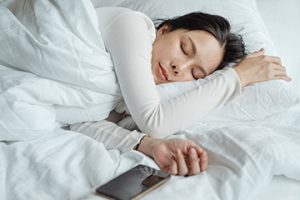 Probably one of the things for good health that people might think is easy, may be one of the hardest things to do. It’s getting adequate quality sleep. It’s even worse in today’s society, where lack of sleep is almost a virtue. It’s all about the quality of your sleep and how much your body requires. Everyone is different. Some people thrive on less sleep than others do. It doesn’t make either one good, bad, lazy, or ambitious. It’s just the difference in their bodies. Most adults require 7 to 9 hours of sleep, but a small minority require 6 or less, with a similar group requiring 10 or more hours.
Probably one of the things for good health that people might think is easy, may be one of the hardest things to do. It’s getting adequate quality sleep. It’s even worse in today’s society, where lack of sleep is almost a virtue. It’s all about the quality of your sleep and how much your body requires. Everyone is different. Some people thrive on less sleep than others do. It doesn’t make either one good, bad, lazy, or ambitious. It’s just the difference in their bodies. Most adults require 7 to 9 hours of sleep, but a small minority require 6 or less, with a similar group requiring 10 or more hours.
Lack of sleep can cause many problems.
Are you gaining weight because you’re always hungry? It could be too little sleep that’s causing the problem. When you don’t get enough sleep your body produces more ghrelin—the hunger hormone, and less leptin—the satiety hormone. You also eat high-calorie sugary food for a quick energy boost. One study found that women who slept a minimum of 6 ½ hours lived longer than those who slept less than five. Another study found that lack of sleep can lead to elevated blood pressure, increased risk of heart disease, and inflammation.
People lose focus and have poor mental performance with too little sleep.
Lack of sleep causes physical problems. It can affect your productivity and mental performance. When you sleep, your brain sorts out the day’s events and creates links to help you remember things better. It ties all the memories, including feelings and sensory input, together for additional help. Lack of sleep can cause stress, which affects you both mentally and physically. It causes the body to create stress hormones, like cortisol. The hormones are linked to heart disease, diabetes, cancer, and even abdominal fat accumulation.
How do you improve your sleep?
Some people take their phones or computers into the bedroom and continue reading or chatting on social media. That’s not a good way to get quality sleep. You need a sleep schedule, which you follow even on the weekends. Don’t take electronic devices, like your phone, TV, or computer, into the bedroom. The bedroom should be relatively cool and as dark as possible for the best night’s sleep.
- When you get adequate sleep, you’ll improve your athletic performance. It also works the other way, the more active you are, the better your night’s sleep.
- A diet low in sugar and processed food can help you sleep better. Almonds and other food high in melatonin can help you sleep, just as turkey or food with tryptophan can. Food high in vitamin D and omega-3 fatty acids improves sleep quality.
- Taking a nap during the day can reduce any sleep deficit, especially if your body requires more than the traditional 8 hours. Knowing your body is vital. Too much sleep can leave you feeling as groggy as too little.
- The CDC released estimates indicating 1/3 of adults aren’t getting enough sleep. Lack of sleep affects your health and your safety. They estimate that over 100,000 accidents occur due to fatigue.
For more information, contact us today at Next Level Fitness
